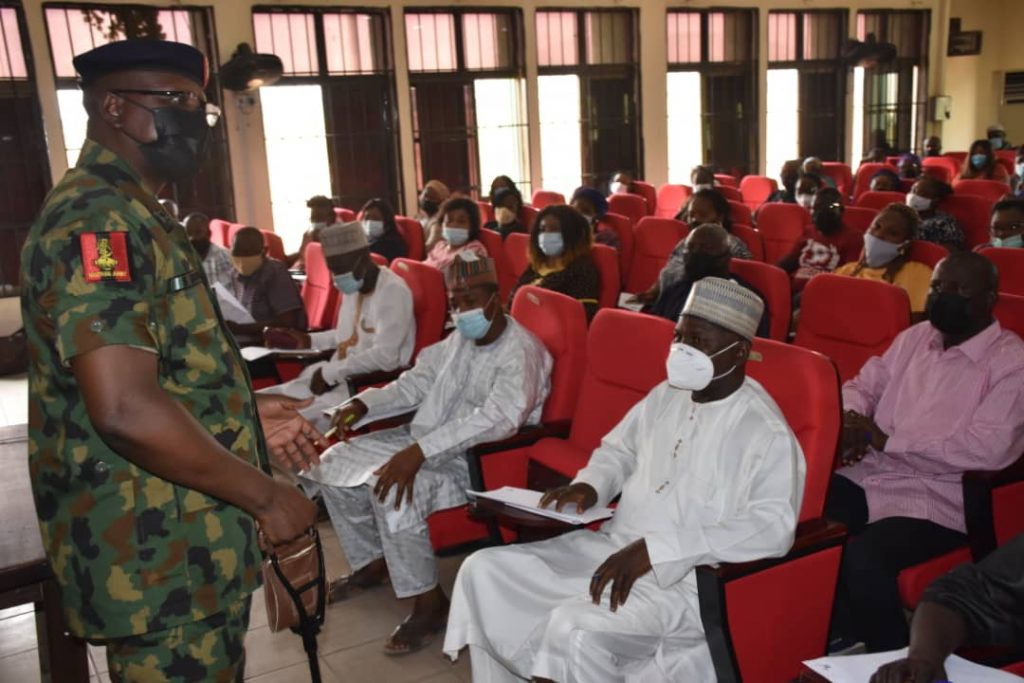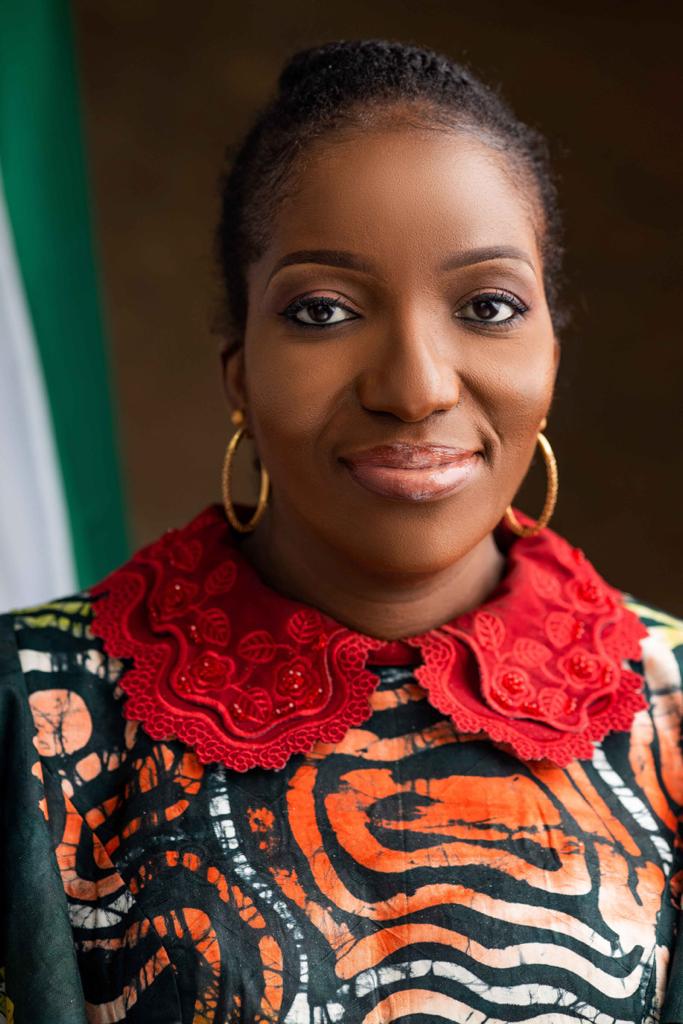Featured
NYSC Will Tap on Corps Members’ Potentials For Socio-Economic Development- Brig. Gen. Ibrahim

Joel Ajayi
The Director-General, National Youth Service Corps, Brigadier General Shuaibu Ibrahim has said that NYSC Scheme would continue to tap the potentials of Corps Members and harness it for the socio-economic development of the country.
He stated this today at the Public Service Institute in Abuja while addressing NYSC staff before the commencement of the senior staff promotion examination.
In a press statement issued by the Press and Public Relations Adenike Adeyemi (Mrs) stated that, there was the need to consolidate on the relevance of the Scheme and also expand its frontiers for societal growth.
The Director-General further advised the candidates for the examination to perform their statutory responsibilities as NYSC officials in line with the Public Service Rules.

He urged them to set good examples for their Corps Members to emulate and avoid every unethical conduct that can spoil their reputation and tarnish the good image of NYSC Scheme.
“We must tap into the potentials of Corps Members because they have talents”.
“Desist from unethical practices and don’t get involved in criminal conduct, because we will apply the rules on every infraction committed”, the DG added.
Ibrahim, who promised a robust Corps and Staff Welfare said the Scheme has improved its revenue generation drive through its online registration platforms, NYSC Bakery, NYSC water factory and the garment factory.
Featured
NAPTIP Restates Commitment To Fighting Human Trafficking

Joel Ajayi
… decries corruption in law enforcement, weak legislation
The Director-General of the National Agency for the Prohibition of Trafficking in Persons (NAPTIP), Prof. Fatima Waziri-Azi, has pledged the agency’s commitment to fight human trafficking.
Waziri-Azi gave the assurance during an anti-corruption radio program, PUBLIC CONSCIENCE, produced by the Progressive Impact Organization for Community Development, PRIMORG, in Abuja.
The commitment by NAPTIP follows an investigative report by Human Angle Media exposing how many Nigerians trafficked to Egypt are inhumanely treated and exploited by their sponsors.
Represented by the agency’s Director of Public Enlightenment, Mrs. Kehinde Akomolafe, decried the rising number of Nigerians who are victims of trafficking, pledging that “NAPTIP is fighting on all sides to curb human trafficking.”
Akomolafe disclosed that the agency is aware of the report of Nigerians trafficked to Egypt and has already commenced interventions to rescue them while warning citizens to be wary of “offers that are too good to be true.”
She identified weak legislation, lengthy judicial processes, and corrupt law enforcement officials as factors aiding and abetting trafficking in Nigeria and elsewhere in the world.
“Corruption is endemic and cuts across other countries of the world, and that’s why trafficking is easily perpetrated in Nigeria and around the globe. You find law enforcement officials aiding and abetting traffickers. Some of them know these traffickers from their operations either at the entry or exit point. They give them something or become too familiar with them.
“Apart from the bribery aspect, we also have officials turning a blind eye to trafficking activities, and that’s why for us at the agency (NAPTIP), we are not resting.”
According to her, the agency, from inception, secured 672 convictions, 67 in 2023, and 35 persons so far this year (2024). She added that “NAPTIP is winning the war against trafficking but still wants stiffer punishment for traffickers and the support of the judiciary in hastening cases.
“weak legislation is aiding trafficking. That’s why the agency continues pushing for amendments. Currently, NAPTIP is pushing for stiffer punishment against traffickers that will lead to confiscation of their monies and property.
“NAPTIP Director-General (Prof. Fatima Waziri-Azi) is fighting on all sides against human trafficking.
“Where law enforcement officials are found complicit, NAPTIP Director-General does not take it lightly; she doesn’t compromise her anti-corruption stance even when a staff is involved,” Akomolafe stated.
According to the Editor of Southern Operations, Human Angle Media, Kabir Adejumo, many Nigerians trafficked to Egypt engage in forced labour. They are also living in fear as authorities go after illegal immigrants.
Adejumo said victims interviewed during the investigation are willing and interested in returning home, but their sponsors refuse to release their travel passports and threaten to implicate them.
He also revealed that the NAPTIP and Nigerians in Diaspora Commission (NIDCOM) are aware of the plight of Nigerians trafficked in Egypt and have currently rescued one person.
On her part, the Programme Manager of the Human Angle Foundation, Angela Umoro-David, expressed satisfaction at NAPTIP’s response to trafficking cases while urging the agency to stay on course with their mandate.
Umoro-David called on Nigerians to use a Freedom of Information platform (foi.humananglemedia.com) to help citizens navigate requests for public records from different government parastatals and agencies.
She stressed that the platform “is a website where people can submit their FOI requests to us (Human Angle), and we’ll submit it on their behalf to the particular agency. So we act as middlemen, connecting these government parastatals to the citizens”.
Public Conscience is a syndicated weekly anti-corruption radio program PRIMORG uses to draw government and citizens’ attention to corruption and integrity issues in Nigeria.
The program has the support of the MacArthur Foundation
-

 Featured5 years ago
Featured5 years agoLampard Names New Chelsea Manager
-

 Featured4 years ago
Featured4 years agoFG To Extends Lockdown In FCT, Lagos Ogun states For 7days
-

 Featured5 years ago
Featured5 years agoNYSC Dismisses Report Of DG’s Plan To Islamize Benue Orientation Camp
-

 Featured4 years ago
Featured4 years agoChildren Custody: Court Adjourns Mike Ezuruonye, Wife’s Case To April 7
-

 Featured3 years ago
Featured3 years agoTransfer Saga: How Mikel Obi Refused to compensate me After I Linked Him Worth $4m Deal In Kuwait SC – Okafor
-
Sports2 years ago
TINUBU LAMBAST DELE MOMODU
-

 News11 months ago
News11 months agoJubilation In Kaduna As Tribunal Upholds Ekene Adam Winner Of Reps Election
-
Featured5 years ago
Board urges FG to establish one-stop rehabilitation centres in 6 geopolitical zones

1 Comment